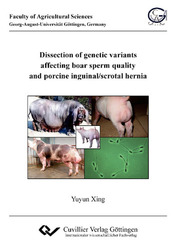| Departments | |
|---|---|
| Book Series (97) |
1383
|
| Nachhaltigkeit |
3
|
| Gesundheitswesen |
1
|
| Humanities |
2379
|
| Natural Sciences |
5409
|
| Mathematics | 228 |
| Informatics | 320 |
| Physics | 980 |
| Chemistry | 1365 |
| Geosciences | 131 |
| Human medicine | 243 |
| Stomatology | 10 |
| Veterinary medicine | 108 |
| Pharmacy | 147 |
| Biology | 835 |
| Biochemistry, molecular biology, gene technology | 121 |
| Biophysics | 25 |
| Domestic and nutritional science | 45 |
| Agricultural science | 1005 |
| Forest science | 201 |
| Horticultural science | 20 |
| Environmental research, ecology and landscape conservation | 148 |
| Engineering |
1799
|
| Common |
97
|
|
Leitlinien Unfallchirurgie
5. Auflage bestellen |
|
Advanced Search
Dissection of genetic variants affecting boar sperm quality and porcine inguinal/scrotal hernia (English shop)
Yuyun Xing (Author)Preview
Table of Contents, Datei (54 KB)
Extract, Datei (73 KB)
With the widespread application of artificial insemination (AI) in the pig industry, it is important
for boars to produce excellent semen because of the high boar-to-sow ratio when using AI
mating. In addition, the pig is a good animal model for human disease. The genetic study of boar
sperm quality can afford referenced information for human fertility research. We performed a
genome-wide scan in a White Duroc × Erhualian three-generation resource population for semen
quality and ejaculation traits. Phenotype data were collected on 206 F2 boars for 8 traits,
including semen volume, sperm concentration, total sperm per ejaculate, sperm motility, sperm
abnormality rate, pH value, ejaculation times and ejaculation time. All these 8 traits showed
remarkable variation among the F2 population. All founders, F1 animals and F2 boars were
genotyped for 183 markers covering 18 autosomes and X chromosome. A quantitative trait loci
(QTL) analysis was performed using a composite regression interval mapping method. A total of
18 QTL were obtained comprising 4 genome-wide significant QTL and 14 suggestive QTL. The
4 genome-wide significant QTL each for semen pH on Sus scrofa chromosome (SSC) 2 and
SSC12, for semen volume on SSC15 and for ejaculation times on SSC17 were detected. The
suggestive QTL were found affecting semen volume on SSC3 and SSC18, sperm concentration
on SSC17, total sperm per ejaculate on SSC1 and SSC2, sperm motility on SSC1, sperm
abnormality rate on SSC4 and SSC9, pH value on SSC6 and SSC9, ejaculation times on SSC6
and SSC16, ejaculation time on SSC6 and SSC17. The QTL explained 5.74-11.83% of the F2
phenotypic variance.
Hernia is one of the most common congenital defects in pigs. Porcine inguinal/scrotal hernia
often causes animal welfare problems and significant economic loss. In this thesis, we
characterized the porcine SRY-related high-mobility group (HMG) 9 (SOX9) and evaluated its
association with inguinal/scrotal hernia. The mRNA sequence of porcine SOX9 (NM_213843.1)
was used to BLAST genomic sequences on http://www.ncbi.nlm.nih.gov/
projects/genome/guide/pig/, revealing two highly homologous (99%) sequences (CU640384.2
and AC157866.2). The genomic structure of the porcine S OX9 was predicted based on their
genomic and mRNA sequences. The porcine SOX9 contains 3 exons and 2 introns, the sizes of
exon 1, 2, 3 and intron 1, 2 are 434 base pairs (bp), 254 bp, 1156 bp, 954 bp, and 572 bp,
respectively. We screened for SNPs from 2000 bp upstream to 2000 bp downstream of this gene
among 10 hernia affected animals and 14 unaffected animals. A total of 13 polymorphisms were
found, and 574 samples from 108 families with 146 hernia samples, along with their parents and
unaffected full sibs, were genotyped for the detected SNPs. The transmission disequilibrium test
(TDT) was carried out with TDT-STDT program version 1.1 to analyze the association between
SOX9 genotypes and porcine inguinal/scrotal hernia. P values of the 13 polymorphisms were
0.922, 0.314, 0.075, 0.559, 0.915, 0.893, 0.900, 0.900, 0.280, 0.689, 0.511, 0.268 and 0.749,
respectively. An 18 bp deletion/insertion in the promoter region showed significant association
with porcine inguinal/scrotal hernia (P = 0.075).
| ISBN-13 (Printausgabe) | 386955424X |
| ISBN-13 (Hard Copy) | 9783869554242 |
| ISBN-13 (eBook) | 9783736934245 |
| Language | English |
| Page Number | 110 |
| Edition | 1 Aufl. |
| Volume | 0 |
| Publication Place | Göttingen |
| Place of Dissertation | Universität Göttingen |
| Publication Date | 2010-07-29 |
| General Categorization | Dissertation |
| Departments |
Agricultural science
|








